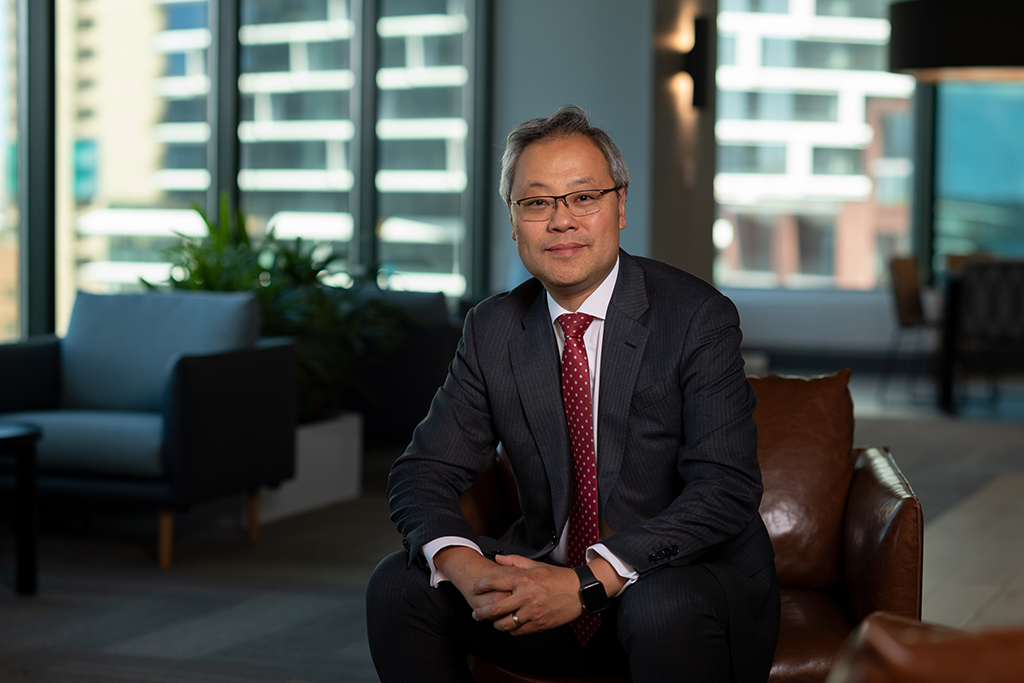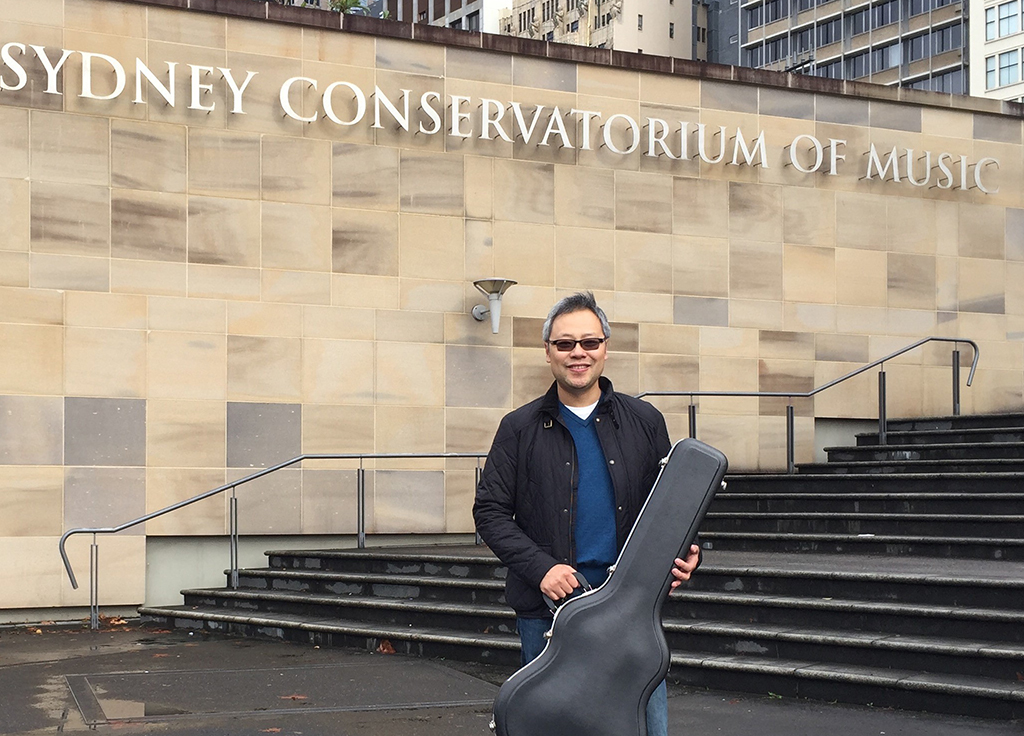Superannuation and higher education changed Peter Chun’s life. He spent his early childhood in Hong Kong in the 1970s, where both his parents were teachers. Hong Kong, then still a British colony, had defined benefits superannuation schemes for teachers and when his father turned 45 he could access early retirement benefits if he permanently migrated out of the country. In 1978 the family moved to Australia primarily so the children could access higher education, something difficult in Hong Kong.
In May this year, Chun was appointed Chief Executive of UniSuper—the industry fund of the higher education and research sectors—managing over $100 billion and looking after 450,000 members.
It’s a job that neatly combines the two formative influences; super and tertiary education.

“I have a strong connection to super and also tertiary education, and that’s why this role at UniSuper is really my dream job,” Chun says. “What happened with my family really highlights what we do in superannuation really matters. We have a world class tertiary education system in Australia as well as a world class retirement savings system.”
“I have a strong connection to super and also tertiary education, and that’s why this role at UniSuper is really my dream job”
As CEO, Chun is focused on his mission to make UniSuper, which recently opened to members outside of higher education, a winner in the new world of choice. And he wants to maintain the fund’s leadership in ESG and deliver great outcomes for members in retirement. But he also has a more personal mission: to leave a legacy of diversity amongst leaders, not just of super funds, but in broader world of Australian corporate and economic life.
“We’re a fabulous multicultural country but I still believe there’s genuinely a lack of diversity, particularly cultural diversity, in senior corporate roles. I’ve certainly become really passionate about advocating for diversity and it’s something I’m really keen to do more at UniSuper, as well. It’s all about being really inclusive, about supporting people from different backgrounds and experiences, so that you can be yourself and you can bring your whole self to work.”
Moving to Australia and a business and finance path
Chun was only eight when the family moved to Australia. They couldn’t speak English and so his parents couldn’t teach as a profession. So, like many migrants they opened a Chinese restaurant in Sydney’s Bondi Junction. “Back then, we’re talking about late 70s and early 80s, Chinese food wasn’t what I would call authentic. We had lemon chicken, Mongolian lamb, fried ice cream, and I’d never seen any of that stuff growing up in Hong Kong. We’ve definitely come a long way since then!”
Chun was fascinated by business and finance and after graduating from school, he completed a Bachelor of Economics at Macquarie University, specialising in actuarial studies. He then qualified as an actuary and spent the early part of his career as a defined benefits consulting actuary.
Chun has since spent his entire career in superannuation, working across funds management, life insurance, retail super funds and industry super funds. “I guess I’ve always been really passionate about the superannuation industry and I guess it began from my dad getting that access to his retirement savings to come here. (To this day, Chun’s 89-year-old father still gets a defined benefits pension cheque from the Hong Kong government.)
Chun’s roles in super have included acting and joint CEO of Colonial First State and, before joining UniSuper as CEO, he was Group Executive, Member Growth at Aware Super.
The influence of his schoolteacher parents meant the importance of education has always been instilled in him and it became a core part of his life and upbringing. Grit and hard work is also crucial, Chun says, something he learnt working in his family restaurant for almost a decade during his school years.
In 2014 he spent two months overseas at Harvard Business School completing their Advanced Management Program, which he describes as “life changing”. “The most amazing experience I took away was the relationships. There were about 150 participants in the program and they came from over 40 countries around the world. It’s really a very diverse group of people and to this day I really remain close to many of those from my living group.”
The course particularly highlighted the importance of diversity. But another lesson was the role of legacy. Most of Chun’s fellow students were in their mid to late 40s. “Harvard describes it as halftime in your life and your career. And they really get you to think about what you want your second half to be.”

Making a mark at UniSuper
So when the opportunity to lead UniSuper came up, Chun realised it was a chance to make a mark and leave a positive legacy. After two months in the job, Chun says he has been impressed by the fund’s investment capabilities, overseen by Chief Investment Officer John Pearce.
UniSuper, which has more than $100 billion of funds under management, was one of the first super funds to manage money in-house and now has over 70 per cent of assets managed by internal teams. Chun says that has allowed the fund to engage strongly with the companies UniSuper invests in and helps them take leadership issues on ESG. But it also helps keeps fees low.
The fund will never manage 100 per cent of assets in-house, Chun says, and will continue to work with specialist external managers in areas such as private equity.
Chun is also impressed with UniSuper’s financial advice capability. The fund recently lowered its price for single issue intrafund advice from over $500 to $80. “The take-up has been fantastic and exceeded all our expectations. Importantly member satisfaction has also increased significantly,” he says, adding it is an area the fund is looking to grow.
The third area Chun is happy with is digital engagement. UniSuper used to run a lot of face-to-face seminars on campuses, but during lockdown that wasn’t possible. Its on-demand and live webinars have proven popular and are much more scalable, with registrations increasing from 24,000 to more than 40,000 a year.
But Chun says one of the most pleasing aspects of UniSuper is the deep care for members and employers. “I think this really comes from the DNA of being a super fund built by the people within the higher education sector for those working in the sector. We strongly feel a part of that university family.”
New vision for the widening member-base
In July 2021, UniSuper opened to those members from outside the higher education sector, which requires a new vision. Chun says there are three tenets to his new vision for UniSuper.
The first is ‘winning in the choice world’. “We want members to choose to join us and stay with us because it’s no longer about the default system. We are entering a new era of choice and for me it’s about becoming someone’s first fund.” He adds that UniSuper’s presence on campuses provides a tremendous opportunity to target university students and graduates and become their first fund.
“We want members to choose to join us and stay with us because it’s no longer about the default system. We are entering a new era of choice and for me it’s about becoming someone’s first fund.”
As part of ‘winning in the choice world’, Chun also wants UniSuper to become members’ last fund; to retain members into and through retirement, as well as attracting new members who are starting to plan for retirement.
Another part of UniSuper’s vision is to continue being an ESG leader.
Chun notes a lot of members are very focused on climate risk and decarbonising the economy, which he describes as “the biggest issue or our generation.” “We are already a leader in this area. We are one of the country’s largest managers of sustainability options.” The fund runs over $13 billion of ESG-thematic funds and has published a climate risk transition report for each of the past four years.
The third tenet of Chun’s vision is to help members during the drawdown phase and converting balances to a sustainable income in retirement. “We want to really focus on retirees and becoming a trusted brand that people turn to for their retirement. That’s advice as well as a range of suitable products.”
Chun became CEO at a time when both super and higher education sectors face significant challenges. Australia’s university sector has been impacted by the loss of international student revenue when borders closed.
The impact of Your Future, Your Super
When it comes to the super industry, Chun says the Your Future, Your Super changes—fund stapling and the performance test—are the most significant reforms in the 30 years he’s been in the industry.
Fund stapling is a sensible policy agenda to minimise the number of multiple super accounts, Chun says. “It’s something we support. It means that super funds will have to lift the bar, will have to be competitive, and we welcome competition because we have a very compelling proposition to offer.”
When it comes to the performance tests, Chun says it also makes sense that all members should have access to high-quality super funds. “The idea of weeding out low performers makes sense. We are one of the strong performers, so there was no issue in that we passed the performance test.”
“The idea of weeding out low performers makes sense. We are one of the strong performers, so there was no issue in that we passed the performance test.”
But Chun has concerns about the test being rolled out next year to ‘choice’ products. “I think for some of the choice products there are some potential unintended consequences.” Chun says, for example, as one of the country’s largest managers of ESG thematic funds, UniSuper’s members have chosen to invest in these portfolios. “But with these sorts of strategies, the performance test doesn’t really recognise some of the ways the product, if you like, was put together.”
He says a notional standard benchmark doesn’t account, for example, for how ESG portfolios are managed. “And so there are some potential unintended consequences in that, even though our members have chosen these types of investment options, the actual methodology of the performance test is not conducive to truly measuring our performance or whether it’s a good product for our members.”
Chun says there are some aspects of performance test which he believes the regulator may need to look at over time.
Fund consolidation has obviously been a major theme in recent years and is likely to continue in the wake of recent reforms. Chun says that UniSuper’s focus is on organic growth, particularly after opening up the fund, but the fund is also keeping an eye on small mergers as potential bolt-on opportunities to complement its growth trajectory. “Of course, it will have to be in our members’ best interest before we look at that, but we’re definitely open to considering mergers when appropriate.”
Diversity in life and interests is important
Chun has a high-powered career but has managed to rise to other challenges outside of work. His wife and kids are extremely musical. When his son was seven (he’s now 14) Chun decided to learn classical guitar with him. They would both head to the Conservatorium of Music in Sydney to sit exams. Chun, who is aiming to sit for his grade 3 exam, has been eclipsed by his son who has passed all the exams and now has a music scholarship at school. “My son now teaches me and it’s a really good way to relax and keep that part of your brain going.”
Work-life balance and supporting flexibility is important at UniSuper, Chun says, particularly in the wake of COVID-19, and the fund recently received FlexCareers’ FlexReady Certification for its flexibility policy, receiving the highest score and level of certification for any corporate or non-government employer to date.
Chun says rather than the ‘great resignation’—the trend for people to quit jobs after COVID-19—he likes to use the term ’great realignment’. “It’s more about realigning an organisation, so that we’re connecting with our people and definitely I think the big theme of flexibility is going to be something that will differentiate organisations, and something we are very much focused on at UniSuper.”
Chun is focused on delivering his vision of UniSuper winning in the choice world and leading in ESG and retirement.
But he also wants to leave a legacy of diversity. “When my kids enter the workforce and beyond, I’d love for them to see a country that is genuinely really diverse in senior leadership roles, particularly from a gender and cultural lens.
“I think there’s been good focus and progress made on gender diversity in corporate leadership. For me, it’d be fantastic if I’ve created a bit of a legacy where we see a lot more diversity in senior leaders from different cultures, different backgrounds, whether that be in politics, media or corporate Australia – similar to what I experienced at Harvard. I think that will be my legacy and a big focus of the second half of my life.”






